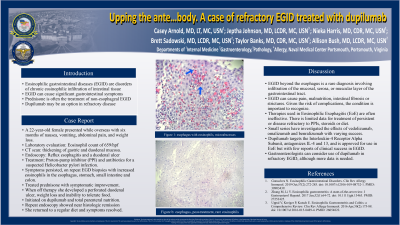Monday Poster Session
Category: Esophagus
P1896 - Upping the Ante...body. A Case of Refractory EGID Treated With Dupilumab
Monday, October 23, 2023
10:30 AM - 4:15 PM PT
Location: Exhibit Hall

Has Audio
- CA
Casey Arnold, DO
Naval Medical Center
Portsmouth, Virginia
Presenting Author(s)
Casey Arnold, DO1, Jeptha Johnson, MD1, Nieka Harris, MD1, Brett Sadowski, MD2, Taylor Banks, MD1, Allison Bush, MD1
1Naval Medical Center, Portsmouth, VA; 2Naval Medical Center, San Diego, CA
Introduction: Eosinophilic gastrointestinal diseases (EGID) are disorders of chronic eosinophilic infiltration of intestinal tissue. We present a rare case of EGID involving the esophagus, stomach, small intestine and colon with symptomatic duodenal ulcers and pyloric stenosis that was successfully treated with histologic and symptomatic improvement with dupilumab.
Case Description/Methods: A 22-year-old female presented to primary care while overseas with six months of nausea, vomiting, abdominal pain, and weight loss. On exam she had tachycardia and abdominal pain. Laboratory evaluation demonstrated an absolute eosinophil count of 659 and a computed tomography (CT) scan noted thickening of the gastric and duodenal mucosa. Reflux esophagitis and a duodenal ulcer were identified on endoscopy. She was initially treated with a proton-pump inhibitor (PPI) and antibiotics for a suspected Helicobacter pylori infection. She was returned from her military service overseas. Her symptoms persisted and a repeat endoscopy and colonoscopy showed a traversable pyloric stenosis but otherwise normal mucosa. Biopsies revealed heavily increased eosinophils in the esophagus, stomach, small intestine and colon. Evaluation for infections and malignancy were negative. She was treated for EGID with prednisone with symptomatic improvement. When off therapy she developed a perforated duodenal ulcer, weight loss and inability to tolerate food. She was then initiated on dupilumab and total parenteral nutrition. Repeat endoscopy showed few eosinophils in the cardia but the esophagus and other gastric biopsies were negative for eosinophils. She returned to a regular diet and symptoms resolved.
Discussion: EGID beyond the esophagus is a rare diagnosis involving infiltration of the mucosal, serosa, or muscular layer of the gastrointestinal tract. EGID can cause pain, malnutrition, intestinal fibrosis or strictures. Given the risk of complications, the condition is important to recognize. Therapies used in Eosinophilic Esophagitis (EoE) are often ineffective. There is limited data for treatment of persistent or disease refractory to PPIs, steroids or diet. Small series have investigated the effects of vedolizumab, omalizumab and benralizumab with varying success. Dupilumab targets the Interleukin-4 Receptor Alpha Subunit, antagonizes IL-4 and 13, and is approved for use in EoE but with few reports of clinical success in EGID. Providers can consider use of dupilumab in refractory EGID, although more research is needed.
Disclosures:
Casey Arnold, DO1, Jeptha Johnson, MD1, Nieka Harris, MD1, Brett Sadowski, MD2, Taylor Banks, MD1, Allison Bush, MD1. P1896 - Upping the Ante...body. A Case of Refractory EGID Treated With Dupilumab, ACG 2023 Annual Scientific Meeting Abstracts. Vancouver, BC, Canada: American College of Gastroenterology.
1Naval Medical Center, Portsmouth, VA; 2Naval Medical Center, San Diego, CA
Introduction: Eosinophilic gastrointestinal diseases (EGID) are disorders of chronic eosinophilic infiltration of intestinal tissue. We present a rare case of EGID involving the esophagus, stomach, small intestine and colon with symptomatic duodenal ulcers and pyloric stenosis that was successfully treated with histologic and symptomatic improvement with dupilumab.
Case Description/Methods: A 22-year-old female presented to primary care while overseas with six months of nausea, vomiting, abdominal pain, and weight loss. On exam she had tachycardia and abdominal pain. Laboratory evaluation demonstrated an absolute eosinophil count of 659 and a computed tomography (CT) scan noted thickening of the gastric and duodenal mucosa. Reflux esophagitis and a duodenal ulcer were identified on endoscopy. She was initially treated with a proton-pump inhibitor (PPI) and antibiotics for a suspected Helicobacter pylori infection. She was returned from her military service overseas. Her symptoms persisted and a repeat endoscopy and colonoscopy showed a traversable pyloric stenosis but otherwise normal mucosa. Biopsies revealed heavily increased eosinophils in the esophagus, stomach, small intestine and colon. Evaluation for infections and malignancy were negative. She was treated for EGID with prednisone with symptomatic improvement. When off therapy she developed a perforated duodenal ulcer, weight loss and inability to tolerate food. She was then initiated on dupilumab and total parenteral nutrition. Repeat endoscopy showed few eosinophils in the cardia but the esophagus and other gastric biopsies were negative for eosinophils. She returned to a regular diet and symptoms resolved.
Discussion: EGID beyond the esophagus is a rare diagnosis involving infiltration of the mucosal, serosa, or muscular layer of the gastrointestinal tract. EGID can cause pain, malnutrition, intestinal fibrosis or strictures. Given the risk of complications, the condition is important to recognize. Therapies used in Eosinophilic Esophagitis (EoE) are often ineffective. There is limited data for treatment of persistent or disease refractory to PPIs, steroids or diet. Small series have investigated the effects of vedolizumab, omalizumab and benralizumab with varying success. Dupilumab targets the Interleukin-4 Receptor Alpha Subunit, antagonizes IL-4 and 13, and is approved for use in EoE but with few reports of clinical success in EGID. Providers can consider use of dupilumab in refractory EGID, although more research is needed.
Disclosures:
Casey Arnold indicated no relevant financial relationships.
Jeptha Johnson indicated no relevant financial relationships.
Nieka Harris indicated no relevant financial relationships.
Brett Sadowski indicated no relevant financial relationships.
Taylor Banks indicated no relevant financial relationships.
Allison Bush indicated no relevant financial relationships.
Casey Arnold, DO1, Jeptha Johnson, MD1, Nieka Harris, MD1, Brett Sadowski, MD2, Taylor Banks, MD1, Allison Bush, MD1. P1896 - Upping the Ante...body. A Case of Refractory EGID Treated With Dupilumab, ACG 2023 Annual Scientific Meeting Abstracts. Vancouver, BC, Canada: American College of Gastroenterology.
